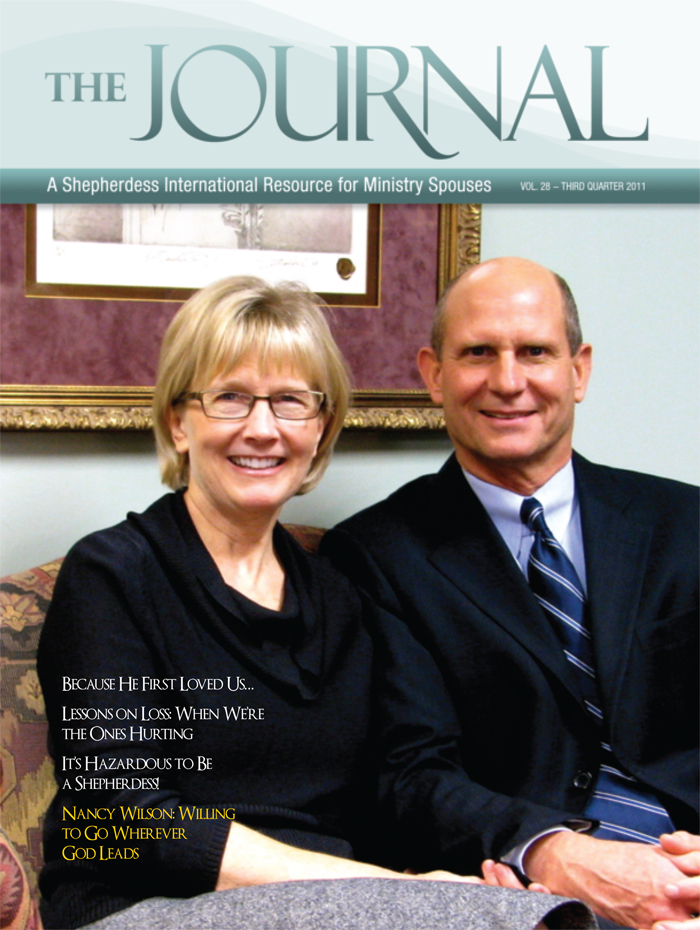Last quarter, I wrote about grief, about our calling as pastors’ wives to push past our own insecurities and find ways to truly “share each other’s griefs” and “bear each other’s sorrows” when someone in our sphere of influence is hurting. But what about when we are the grieving ones? What about when suffering and tragedy strike us personally? What are we supposed to do then?
Do we keep it secret? Should we keep a happy face when we’re around others so they don’t know we’re hurting, can’t pray for us, and certainly can’t offer to help? And then do we wonder why we feel that people don’t care or resent that nobody ever returns the act of sharing our burdens? Do we hang it out there for everyone to see? Should we sob out our disillusionment on the shoulder of every church member, friend, and passersby who will listen? Letting everyone know every detail of every little hurt or grief can backfire badly—we all know that.
Or maybe we share a little and stuff the rest away? Should we pretend that we’re stronger than the pain? Should we keep working and ministering and serving and acting like everything is normal? This may seem like a good solution until all the junk hidden under the surface bubbles up and spills over at some inopportune moment.
So how should we deal with tragedy, turmoil, and suffering in the pastoral home? A review of Jesus’ example can give us some pointers.
First of all, we take it to God. When Jesus was worn out, depleted, and facing the greatest trials and agonies of His human life, He always went away to pray (Mark 1:35; 14:32; Luke 5:16; 6:12). He sought solitude and privacy so that He could unburden His heart to His Father before sharing with any other human being.
Second, He kept a circle of close friends who built Him up and replenished His soul with fellowship and kindness (and good food!). All four gospels mention His trips to Bethany, where He relaxed with His friends Mary, Martha, and Lazarus. It was a safe place where He could escape the pressures of ministry and enjoy the fellowship of people who understood Him.
These are good ideas for today’s pastoral families, too. It is wise to share our hearts with God in prayer before we spill our guts to others in conversation. And it is smart to surround ourselves with a few quality friendships—perhaps even separate from our immediate colleagues—where we can trust the relationship and have social interaction outside of ministry.
But then there are times when things happen that are overwhelming—terminal illness strikes, marriages crumble, sudden tragedy upends our reality—and we need more support than just some good friendships.
When horrifying things happen, we need to give ourselves the freedom (and the time) to grieve. If we spend all our energy keeping it “pulled together” and continue serving at the same pace we always have, we are almost guaranteed to break down sooner than later.
If we neglect the agonizing process of dealing with our personal griefs and tragedies in a healthy way, our ability to minister and serve others will be compromised. We cannot effectively guide, counsel, or mentor those around us when we have unresolved issues in our own lives. Sorrows that have never been properly grieved are likely to influence our judgment and subtly impair our ability to clearly discern leadership issues.
While we may cognitively know that a life of ministry comes with no guarantee of bliss, we may still find it hard to accept that tragic things can happen even when we have given our entire identities to serving God and meeting the needs of others. It can feel unfair and unjust and may bring overwhelming disillusionment or even depression. Disillusionment can bring bitterness, and depression can bring lethargy; neither are positive emotional states for a healthy spiritual leader.
As a member of a pastoral family, I believe that no matter our culture or personality, we have an obligation to the people we serve to seek help when we are hurting. If we are too proud, too private, or too personally withdrawn to submit to counseling or seek professional help, we are effectively placing ourselves above our divine calling to ministry.
This process of seeking help won’t be the same for everyone. Some might see a professional Christian counselor, others will seek advice from wise mentors, and others may take a sabbatical or a retreat in nature. You might combine several of these into a journey of healing that meets your needs. The important thing is to actually seek help. Don’t pretend that unaddressed grief isn’t going to have repercussions on the health and stability of your family, your marriage, and the lives of your children. Your ability to minister effectively will be compromised, whether you can see it now or not.
As families who have dedicated our lives to serving God’s people, we have a duty and an obligation to humbly do whatever it takes to seek emotional health and psychological balance in our own lives. If we don’t, we cannot know the damage our attempts at ministry may do to others because of the issues we are unwilling to face in the mirror.
If you or a ministry family you know are suffering, I hope you will prayerfully consider what steps you can take to initiate an intentional journey of healing.
